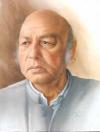Habib Jalib poet from India was born on March 24, 1928, had 65 years and died on March 12, 1993. Poems were written mainly in Urdu language. Dominant movement is political.
Biography
Habib Jalib was a Pakistani revolutionary poet. A left-wing activist and politician, he was a staunch democrat who opposed martial law, authoritarianism and state oppression.
Early Life
Habib Jalib was born as Habib Ahmad in a village near Hoshiarpur, British India. He migrated to Pakistan after partition and worked as a proofreader in Daily Imroze, Karachi. He was a progressive writer and soon started to grab the audience with his enthusiastic recitation of poetry. He wrote in plain language, adopted a simple style and addressed common people and issues. But the conviction behind his words, the music of his voice and his emotional energy coupled with the sensitivity of the socio-political context is what stirred the audience.
Political Views
He was a Marxist-Leninist and aspired to the ideals of Communism. He was a member of the Communist Party of Pakistan; later when the Communist Party was banned and started working under the banner of National Awami Party (NAP), Jalib joined the NAP. Due to his blunt expression of his beliefs, he suffered hard time all his life and spent most of time in Jails.
Ayub Khan's Martial Law
Habib Jalib was first imprisoned during the martial law regime of Ayub Khan due to his defiant views on Ayub Khan's capitalistic policies. He wrote his legendary poem "Dastoor" during those days.Criticizing those who supported Ayub Khan's regime, he wrote:
"There is smoke of teargas in the air
and the bullets are raining all around
How can I praise thee
the night of the period of shortsightedness."
A humble man with limited means of livelihood, Jalib could never reconcile with the dictatorship of Ayub Khan. So when Ayub enforced his tailor-made constitution in the country in 1962, which a former prime minister Chaudhry Muhammad Ali likened to the Clock Tower of Lyallpur, Jalib wrote a poem against it.
Due to his daring revolt against the order of the day, Jalib was banned from official media but he remained undeterred. He rather started a tirade against the tyranny with more resolution. It reached its zenith when Fatima Jinnah decided to contest elections against Ayub Khan. All democratic forces rallied around her and at her election meetings, Jalib used to recite his fiery poems in front of an emotionally-charged crowd. His most popular poem at that time was:
"The paradise is under the feet of the mother. So come into her fold."
Bhutto's Government
In 1972 when Zulfikar Ali Bhutto came to power, many of his colleagues were able to hit fortunes. He, on the other hand, kept his integrity and stuck to ideology. According to sources close to Zulfiqar Ali Bhutto, one day Habib Jalib went to Bhutto's place to meet him. Bhutto on seeing him said that when are you going to come (referring to joining his political Party) Jalib said, "Have the oceans ever fallen in rivers".
Zia-ul-Haq's Martial Law
During General Zia-ul-Haq's dictatorship, Jalib joined movement for democracy. He wrote the famous poem on Zia, where he asked how he could write darkness as Zia ( Zia literally means light in Urdu).
"How can I write a human as God?"
Benazir Bhutto's Government
In 1988, General Zia-ul-Haq died in air crash and general elections were held. Benazir Bhutto came into power and released Habib Jalib. Fortunes were distributed to those who supported the government rather than those who supported democracy. Disappointed at the state of the nation, when asked if he felt any change after democracy, he said:
"The status of the poor is still the same
the days of the ministers have indeed changed
every Bilawal (name of the only son of Benazir Bhutto) of the country is under debt
while Benazirs (literally the poor) of the country walk without shoes ."
Poetry
Jalib?s poetry reflected his vision and approach to life. He never deviated from his chosen path. His love for humankind, his sympathy for the underdog and his passion for the fellow-beings were reflected in his verses. What is quite significant and somewhat rare in a poet who is also charged with political ideology is his capacity to suppress his anger against the injustices and tyrannies that he witnesses in life.
Jalib himself remained a victim of a cruel social order. He was imprisoned for some time after being wrongly implicated in various crimes.
With no regular source of income, he had a rootless existence, but he never considered compromising with his tormentors and coming to terms with established order. And yet Jalib?s poetry only reflects his anguish. It is not an expression of his anger or frustration. At times it is pensive, couched in sarcasm, but his typical soft melodious tone is always there. He believed that the Pakistani leaders should stop obeying the Westerners. His following poem reflects this.
"Farangi ka jo main darbaan hota
Tho jeena kis kadar aasaan hota
Meray bachay bhi amreeka may parthay
Main Har garmi may main Inglistaan hota
Meree English bhi balaa ki chusth hotee
Balaa say jo na main Urdu-daan hota
Sar jhuka kay jo ho jaata sir main
Tho leader bhi azeem-u-shaan hota
Zameenain meree har soobay may hoteen
May wallah sadr-e-Pakistan hota"
Death
Habib Jalib died at Lahore, Pakistan. His family refused the offer of the then government to pay for his funeral expenses. ..






